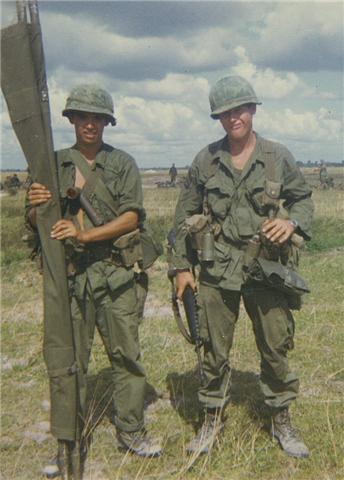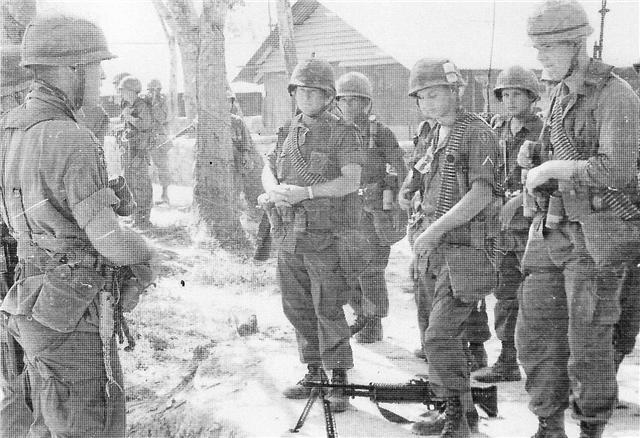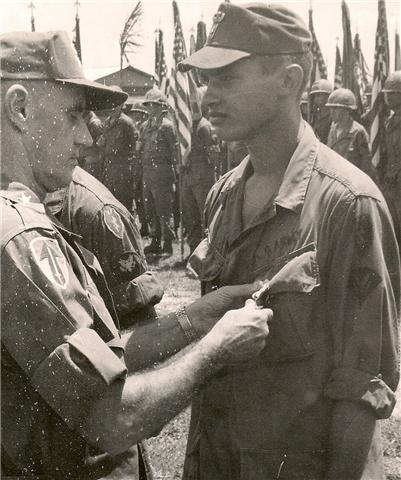Dan Rousseau in the Grass and under Fire – Hanging It All on the Line
by Howard Landon McAllister
If you ask anyone who served in combat and under fire in the Vietnam war about heroic soldiers he knew in the war, chances are that many of them were combat medics. I did not have an opportunity to serve with Dan Rousseau in combat, but he is among the soldiers I admire most, and a member of a small fraternity—the combat medics-- to whom some of us owe our lives--along with our descendants, who will probably never be aware of it.

It does not take much imagination to recognize the raw courage of a young soldier who crawls forward, unarmed, from a position of relative safety into a hornet's nest of rifle fire and other dangers, to rescue a wounded comrade he may not even know. Sometimes, the act of courage became one of sacrifice that sent both of them home to graves in peaceful cemeteries, where they lie to this day, without anyone knowing the details of their final struggle. This is why you should etch it into your memory when you think of American Heroes. They did not all die in long-ago wars like our Revolution, and none of them are like politicians the press tells us we should use as models for our lives. Some of them, like Dan Rousseau, are still living.
Technically, Wolfhound medics were assigned to the division's medical battalion, but it was more an accounting device than a reality. Wolfhounds never really believed it, anyway. Wolfhound medics were Wolfhounds. In hindsight, it may have created nettlesome administrative problems that sometimes kept brave and noble soldiers from getting a fair shake, and sometimes routine administrative procedures fell through a crack, to be discovered later, to their discomfort, inconvenience, or monetary loss. Their personnel records were managed in the medical battalion, and this could create an unfortunate “out of sight, out of mind” situation among the personnel clerks in their parent units. The personnel clerks had to keep track of medics serving with infantry and other combat arms units that were all over the division area, sometimes being temporarily cross-attached to other infantry units, or to other combat arms units in various reinforcement schemes.
But as a practical matter, and in day-to-day operations, the medics were Wolfhounds—special Wolfhounds, in that they practiced their lifesaving craft under fire, usually unarmed, in a hostile, life-threatening environment. Under the worst of conditions, their lives were constantly in danger, and during the best times, their lot was to endure the heat and cold and rain as part of usual environmental hostility, along with the casual pestilence that merely being in Vietnam brought to their daily lives.
In those days, Dan Rousseau was from Willimansett, Massachusetts , far from his present home in Washington state. In March 1966, he joined the Army. In basic training, he proved to be a natural rifleman, winning a trophy as the best shot in his unit with the M14 rifle. After basic, he was trained as a medic at Ft. Sam Houston, graduating third in his class. He volunteered for airborne training, and after winning his wings and a 30-day leave at home, the next stop was Vietnam, where he arrived in October 1966.
By the middle of November, he was an experienced combat medic. The Wolfhounds had taken on the best soldiers in four enemy regiments which surged out of fortified bunkers. They were writing a new page in their history during Attleboro, as the operation was called. Rousseau came through the operation without being hit by enemy fire, but would not go unwounded much longer.
It was a dangerous and exciting time to be in the Wolfhounds. On the last day of the year, in an operation kept secret for years—a futile attempt to rescue captured American soldiers who had been moved by their captors from Vietnam across the border into Cambodia—the First Wolfhounds crossed the border in a lightning-strike raid. One of the so-called ”Bright Light” operations, this one was called Bright Light Cobra Tail. Rousseau took part in the daring raid.

In the first days of the new year, the Wolfhounds continued to see action. On January 8, 1967, During Operation Cedar Falls, Rousseau was with the third platoon of Company C. The unit was operating in the Iron Triangle, a hotbed of enemy activity at the time.
Captain Joe K. Clary, the CO of Company C, said the unit was pinned down after an assault landing in flooded rice paddies near the Saigon River in front of heavily-defended Vietcong positions.
“When the third platoon was stopped, Rousseau crawled 150 feet on his belly in the mud and water to take care of the wounded,” Clary said. “He didn't even bother to take care of himself after being hit—and worked continuously under fire for for four hours.”
Looking back on his experience so many years ago, Dan Rousseau talked about the small creature comforts sent from home that helped soldiers to survive. A special memory was the canned fruit his mother sent him.
“In the packages we got from home, we liked the fruit—but not the fruit cake—we couldn't give it away. When a bottle of booze got through it was welcome,” Rousseau went on.
“But we had to hide it from the Major,” he added.

He remembered how the Wolfhounds adopted the dogs and monkeys during the war, something that continued as long as our units served there. Rousseau had a pet monkey for a time, one he remembered that would imitate anything the soldiers did, destroying toothpaste and shaving cream in the process.
Dan Rousseau's heroism earned him a Silver Star, which he was awarded in a ceremony at Cu Chi. He continued to serve in Vietnam until October 1967, when he returned home and to civilian life. His war was over.
The details of the Vietnam war long ago receded into Wolfhound history. The role played by the combat medics has earned a place in the hearts of all of the infantrymen who served in that war. Dan Rousseau, and his courage and determination will always be a part of it.
Copyright 2009, Howard Landon McAllister
